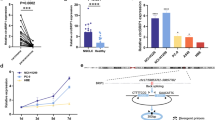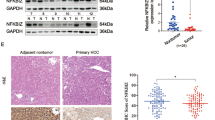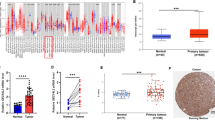Abstract
Rsf-1 (HBXAP) was recently reported to play roles in tumorigenesis and tumor progression. There have been many reports referred to Rsf-1 overexpression in various cancers and associated with the malignant behavior of cancer cells. However, the molecular mechanism of Rsf-1 in non-small cell lung cancer aggressiveness remains ambiguous. In the present study, we found that there was a significant association between Rsf-1 overexpression and poor overall survival (p = 0.028) in lung cancer. Furthermore, knockdown of Rsf-1 expression in H1299 and H460 cells with high endogenous Rsf-1 expression inhibited cell migration and invasion and downregulated MMP2 expression and nuclear levels of NF-κB. NF-κB inhibitor could also block the effect of Rsf-1 in regulation of MMP2 expression. Further experiments demonstrated that Rsf-1 depletion restrained NF-κB reporter luciferase activity and downregulated bcl-2 and p-IκB protein level. In conclusion, we demonstrated that Rsf-1 was overexpressed in lung cancer and associated with poor survival. Rsf-1 regulated cell invasion through MMP2 and NF-κB pathway.





Similar content being viewed by others
Reference
Shih IM, Sheu JJ, Santillan A, Nakayama K, Yen MJ, Bristow RE, Vang R, Parmigiani G, Kurman RJ, Trope CG, Davidson B, Wang TL (2005) Amplification of a chromatin remodeling gene, Rsf-1/HBXAP, in ovarian carcinoma. Proc Natl Acad Sci U S A 102:14004–14009
Davidson B, Trope’ CG, Wang TL, Shih IM (2006) Expression of the chromatin remodeling factor Rsf-1 is upregulated in ovarian carcinoma effusions and predicts poor survival. Gynecol Oncol 103:814–819
Mao TL, Hsu CY, Yen MJ, Gilks B, Sheu JJ, Gabrielson E, Vang R, Cope L, Kurman RJ, Wang TL, Shih IM (2006) Expression of Rsf-1, a chromatin-remodeling gene, in ovarian and breast carcinoma. Hum Pathol 37:1169–1175
Fang FM, Li CF, Huang HY, Lai MT, Chen CM, Chiu IW, Wang TL, Tsai FJ, Shih IM, Sheu JJ (2011) Overexpression of a chromatin remodeling factor, RSF-1/HBXAP, correlates with aggressive oral squamous cell carcinoma. Am J Pathol 178:2407–2415
Schwab M (1998) Amplification of oncogenes in human cancer cells. BioEssays 20:473–479
Tai HC, Huang HY, Lee SW, Lin CY, Sheu MJ, Chang SL, Wu LC, Shiue YL, Wu WR, Lin CM, Li CF (2012) Associations of Rsf-1 overexpression with poor therapeutic response and worse survival in patients with nasopharyngeal carcinoma. J Clin Pathol 65:248–253
Xu J, Tyan T, Cedrone E, Savaraj N (1996) Wang N. Detection of 11q13 amplification as the origin of a homogeneously staining region in small cell lung cancer by chromosome microdissection. Genes Chromosomes Cancer 17:172–178
Shibata T, Uryu S, Kokubu A, Hosoda F, Ohki M, Sakiyama T, Matsuno Y, Tsuchiya R, Kanai Y, Kondo T, Imoto I, Inazawa J, Hirohashi S (2005) Genetic classification of lung adenocarcinoma based on array-based comparative genomic hybridization analysis: its association with clinicopathologic features. Clin Cancer Res 11:6177–6185
Brown LA, Irving J, Parker R, Kim H, Press JZ, Longacre TA, Chia S, Magliocco A, Makretsov N, Gilks B, Pollack J, Huntsman D (2006) Amplification of EMSY, a novel oncogene on 11q13, in high grade ovarian surface epithelial carcinomas. Gynecol Oncol 100:264–270
Hennessy BT, Nanjundan M, Cheng KW, Nolden L, Mills GB (2006) Identification of remodeling and spacing factor 1 (Rsf-1, HBXAP) at chromosome 11q13 as a putative oncogene in ovarian cancer. Eur J Hum Genet 14:381–383
Bostner J, Ahnström Waltersson M, Fornander T, Skoog L, Nordenskjöld B, Stål O (2007) Amplification of CCND1 and PAK1 as predictors of recurrence and tamoxifen resistance in postmenopausal breast cancer. Oncogene 26:6997–7005
Rosen A, Sevelda P, Klein M, Dobianer K, Hruza C, Czerwenka K, Hanak H, Vavra N, Salzer H, Leodolter S (1993) First experience with FGF-3 (INT-2) amplification in women with epithelial ovarian cancer. Br J Cancer 67:1122–1125
Cheng CK, Chow LW, Loo WT, Chan TK, Chan V (2005) The cell cycle checkpoint gene Rad9 is a novel oncogene activated by 11q13 amplification and DNA methylation in breast cancer. Cancer Res 65:8646–8654
Jezierska A, Motyl T (2009) Matrix metalloproteinase-2 involvement in breast cancer progression: a mini-review. Med Sci Monit 15:RA32–RA40
Tokuraku M, Sato H, Murakami S, Okada Y, Watanabe Y, Seiki M (1995) Activation of the precursor of gelatinase A/72 kDa type IV collagenase/MMP-2 in lung carcinomas correlates with the expression of membrane-type matrix metalloproteinase (MT-MMP) and with lymph node metastasis. Int J Cancer 64:355–359
Kenny HA, Kaur S, Coussens LM, Lengyel E (2008) The initial steps of ovarian cancer cell metastasis are mediated by MMP-2 cleavage of vitronectin and fibronectin. J Clin Invest 118:1367–1379
Guttridge DC, Albanese C, Reuther JY, Pestell RG, Baldwin AS Jr (1999) NF-kappaB controls cell growth and differentiation through transcriptional regulation of cyclin D1. Mol Cell Biol 19:5785–5799
Chen C, Edelstein LC, Gélinas C (2000) The Rel/NF-kappaB family directly activates expression of the apoptosis inhibitor Bcl-x(L). Mol Cell Biol 20:2687–2695
Fernández-Majada V, Aguilera C, Villanueva A, Vilardell F, Robert-Moreno A, Aytés A, Real FX, Capella G, Mayo MW, Espinosa L, Bigas A (2007) Nuclear IKK activity leads to dysregulated notch-dependent gene expression in colorectal cancer. Proc Natl Acad Sci U S A 104:276–281
Tew GW, Lorimer EL, Berg TJ, Zhi H, Li R, Williams CL (2008) SmgGDS regulates cell proliferation, migration, and NF-kappaB transcriptional activity in non-small cell lung carcinoma. J Biol Chem 283:963–976
Rahman KM, Ali S, Aboukameel A, Sarkar SH, Wang Z, Philip PA, Sakr WA, Raz A (2007) Inactivation of NF-kappaB by 3,3′-diindolylmethane contributes to increased apoptosis induced by chemotherapeutic agent in breast cancer cells. Mol Cancer Ther 6:2757–2765
Author information
Authors and Affiliations
Corresponding author
Ethics declarations
The study protocol was approved by the institutional reviewer board of China Medical University. All participants provided written informed consent, and the investigation was conducted according to the principles expressed in the Declaration of Helsinki.
Conflict of interest
The authors declare that they have no conflict of interest.
Rights and permissions
About this article
Cite this article
Zhang, X., Fu, L., Xue, D. et al. Overexpression of Rsf-1 correlates with poor survival and promotes invasion in non-small cell lung cancer. Virchows Arch 470, 553–560 (2017). https://doi.org/10.1007/s00428-017-2102-6
Received:
Revised:
Accepted:
Published:
Issue Date:
DOI: https://doi.org/10.1007/s00428-017-2102-6




